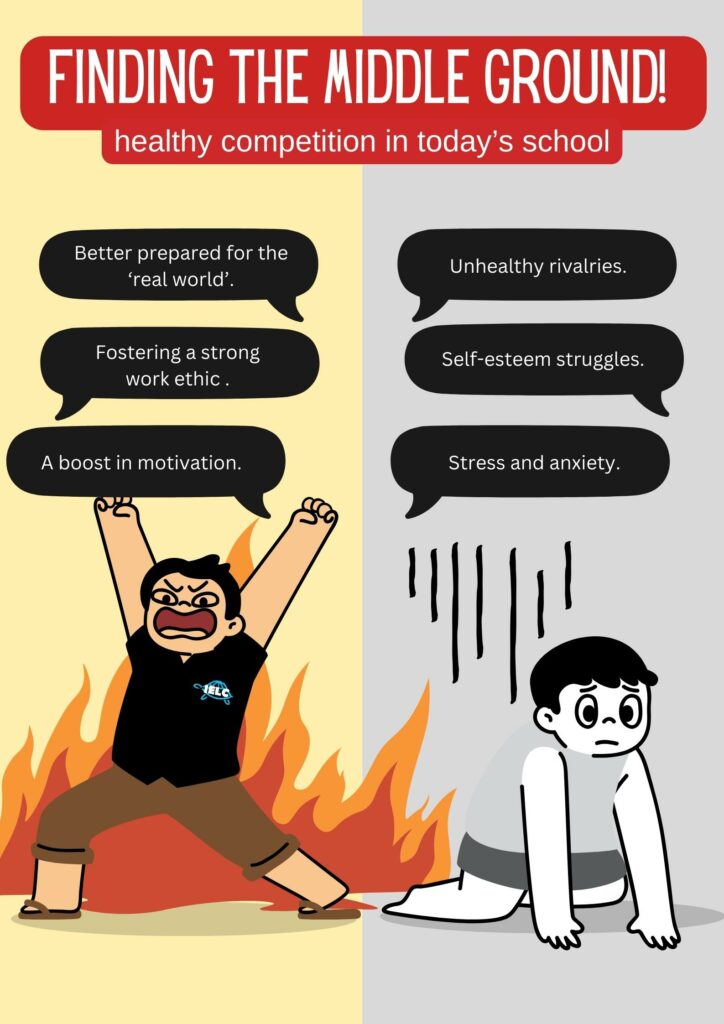
Finding the middle ground: healthy competition in today’s school
Greetings, Teachers!
In this article, we will delve deeper into competitions, specifically, are academic competitions really beneficial or not?
Competition is an integral part of human nature. It drives innovation, encourages individuals to excel, and is often considered one of the foundations of success in various aspects of life.
When discussing education, the topic of competition frequently becomes a subject of debate. Some argue that competition in learning can be beneficial, motivating students to perform their best, while others believe it can be detrimental, leading to stress, anxiety, and an unhealthy obsession with grades.
In this article, we will explore both sides of the argument to understand the role of competition in the world of education. This will provide a clear picture of the benefits and drawbacks of academic competition for students. Let’s get started!

Benefits of academic competition
- A boost in motivation
When students see their friends nailing their studies, it pushes them to step up their game. Think of it like a friendly rivalry in sports – you see someone doing well, and you’re driven to do even better. Many students set higher goals for themselves, aiming to outdo their classmates.
And it’s not just a hunch. Research backs this up. For instance, an article in the Journal of Educational Psychology found that when students experience a bit of healthy competition, they’re more motivated and put more effort into their studies. Cool, right?
- Fostering a strong work ethic
Competition nurtures a solid work ethic among students. To shine in a competitive environment, students need to build discipline, time-management skills, and an unwavering dedication to their studies. They get that consistent effort and the value of hard work are key to reaching academic goals.
According to a report from the National Center for Biotechnology Information (NCBI), students immersed in a competitive learning environment tend to display higher levels of self-discipline and commitment to their education. Now that’s pretty neat!
- Better prepared for the ‘real world’
The professional world? It’s often jam-packed with competition. And guess what? Those school competitions can be a killer warm-up for the challenges students will face in their careers. They gear up with essential skills like resilience, adaptability, and the knack to shine even when the going gets tough.
The World Economic Forum dropped a hint about this too. They stressed how school competitions are a big deal because they kinda mirror the competitive vibes of the job market. It turns out, students who’ve tackled academic challenges head-on are more set to navigate the competitive terrain in their chosen careers!
- Spotting strengths and areas for improvement
Healthy competition? Think of it as a spotlight. It helps students see where they rock and where they might need a little extra push. When they’re in the race, they get a clear picture of what they’re ace at and what needs some tuning. This self-awareness leads to a more balanced and well-rounded education.
And here’s a shoutout from the American Psychological Association: they say competitions can be a killer diagnostic tool for both educators and students. It guides teachers to spot where students might need an extra hand, leading to a more tailored learning experience. Pretty cool, huh?
Competition in education isn’t just a buzzword – it’s packed with perks and backed by studies. It gets students pumped to give their best, builds a strong work mindset, readies them for the ups and downs of the real world, and helps them figure out their strong suits and areas to work on. When done right, competition can supercharge the learning journey and set students on the path to nailing their future goals!
Drawbacks of academic competition
While competition in education can have its pluses, it’s essential to dive into and fully understand its potential pitfalls. Let’s get into the nitty-gritty of the negative impacts of academic competition:
- Stress and anxiety
Intense academic competition often goes hand-in-hand with high stress and anxiety levels among students. The pressure to outdo classmates and bag the top grades can be overwhelming. This mounting stress can deeply impact a student’s mental and emotional well-being, even leading to burnout.
A study published in the Journal of Adolescence spotted a significant link between academic competition and stress levels in students. The study highlighted that students in super-competitive environments felt more stressed than their peers in less competitive settings. This is definitely something we should keep in mind!
- Grades take precedence over everything else
Sometimes, academic competition shifts the spotlight. Instead of focusing on the beauty of learning and really getting the subject, students might just be in it for the high scores. It’s like they’re more into collecting points than cherishing the actual learning journey. And that can mess with the whole essence of education.
A study done by American Educational Research Association points out that when there’s too much emphasis on grades, often sparked by academic rivalry, students might develop a “grade-oriented” approach rather than a “learning-oriented” one. That means they’re gunning for high marks more than genuine understanding and knowledge acquisition. It’s crucial for educational stakeholders to recognize this and strike a balance, ensuring that while grades have their place, they don’t overshadow the broader, enriching experience of true learning!
- Self-esteem struggles
The constant comparison with peers, an outcome of intense competition, can wear down a student’s self-esteem. Especially for those who consistently find themselves a few steps behind their classmates, this relentless self-comparison can cultivate a negative self-image. Such a skewed perception not only puts a dent in their confidence but can also stunt overall personal growth.
The National Association for Self-Esteem sheds light on this very concern. They highlight the detrimental effects of academic competition on self-worth. Their findings underscore that students who perceive themselves as academically inferior to their peers tend to grapple with lower self-esteem and dwindling motivation. It’s a stark reminder that while healthy competition can propel some forward, it can push others into self-doubt, emphasizing the need for balance and support in educational environments.
- Unhealthy rivalries
Sure, a sprinkle of competition can spice up the learning process, but there’s a danger when it shifts from friendly challenges to cutthroat rivalries. When the academic race gets too intense, it can start chipping away at friendships, breed mistrust, and lay down the groundwork for a learning space that’s more about one-upmanship than cooperation.
A study featured in the Journal of Educational Psychology underscores the downsides of over-the-top competition in academic settings. It points out that unhealthy rivalry can curb a student’s willingness to lend a hand to classmates and can cast a dark cloud over the classroom atmosphere. It’s essential to remember that education isn’t just about outdoing one another, but also about collaboration, understanding, and mutual growth!
While academic competition in education has its merits, research doesn’t shy away from highlighting its darker sides. Among these are heightened stress and anxiety, a laser-focus on just the grades, potential dips in self-worth, and the slippery slope into unhealthy rivalries. Yes, competition can light a fire under motivation, but it’s essential to tread carefully. Balancing competition with collaboration and support ensures a healthier, more nurturing educational space for everyone involved.]
Striking a balance:
Strategies to mitigate the negative effects of academic competition
Taking full advantage of academic competition while minimizing its negative side effects demands a nuanced approach. The responsibility falls on both the shoulders of educational bodies and parents to establish a backdrop that endorses beneficial competition. Let’s explore some strategies to find this balance:
- Prioritize personal growth
It’s super important for students to concentrate on bettering themselves rather than always checking how they stack up against their buddies. Schools and parents should hammer home the idea that everyone’s on their own unique path. Progress isn’t about outdoing others; it’s about outdoing your past self. And let’s not forget to give a high-five for every little win; it’s a great way to pump up self-esteem and keep that motivation engine running.
Oh, and there’s this cool piece in the Journal of Personality and Social Psychology that talks about this. When you put the focus on personal growth, students are more naturally motivated and bounce back quicker from setbacks, even when the competition gets tough out there. So it’s like helping them build a shield that protects their motivation and self-esteem! Now that’s pretty cool!
- Encourage collaboration
While there’s value in a little friendly competition, teaming up and working together is just as crucial. Crafting a vibe where students join forces to hit shared goals turns the spotlight from rivalry to unity. Group projects and team tasks are a cool way to get students to see the perks of teaming up and sharing in success.
And here’s a fun fact: these days, being a team player is high on the wishlist for most employers. So, promoting teamwork in school isn’t just good vibes – it’s prepping students for real-world demands!
- Offer adequate support
Students really need that safety net to help them juggle the pressures of academic competition and stress. It’s a game-changer when schools step up with counseling services, giving students a spot to drop by, vent, and get some strategies for keeping their emotional health in check.
And check this out: the American Psychological Association is big on having a solid support squad. They point out that students who’ve got the right backing are better equipped to handle the heat of competition!
- Promote a growth mindset
It’s really valuable for students to get on board with the growth mindset. The idea is simple: our brains and skills aren’t just stuck in one place. With some effort and determination, we can grow and get better. Adopting this mindset helps students see challenges as growth opportunities, not just ego hits.
The concept of the growth mindset, introduced and popularized by psychologist Carol Dweck, has been extensively researched and is proven to enhance motivation and resilience. Students who adopt this perspective are more inclined to embrace challenges and view them as integral to the learning process. This fosters a more positive and proactive approach to education.
Striking a balance in academic competition calls for a combined effort from schools and parents. Prioritizing personal growth, fostering collaboration, giving the right support, and pushing for a growth mindset are solid moves to dial down the negatives of competition. With this approach, students can aim high academically and still keep their mental and emotional game strong.
Summary
Competition in academics can be a double-edged sword, bringing motivation and success on one side, but stress and anxiety on the other. Striking a balance between healthy competition and student well-being is crucial.
Education should not only prep students academically but also arm them with the resilience and adaptability needed for a competitive world outside the classroom. Ultimately, fostering a love for learning and personal growth should be at the heart of any education system.
At IELC, we teach English the right way
Our goal is to get you speaking in English with fluency and confidence as fast as possible. We want to give you the skills you need to fulfil your potential!
Our experienced teachers will guide you along every step of the learning process to ensure that you are not wasting your time, money, and energy on useless language exercises & wrong methods.
Our courses
With our modern campus and technology, we are equipped to provide the best possible courses for children, teens, and adults, including:
Online and on campus IELTS courses
Online and on campus TOEFL PBT courses
Online and on campus TOEFL iBT courses
We offer our classes in group classes or private classes.
No matter what your goals are, our team will help you achieve these goals by providing you with Indonesia’s best English courses!
Talk to our team today to get your FREE consultation and take your first step towards success.
Sincerely,

IELC Academic Director
